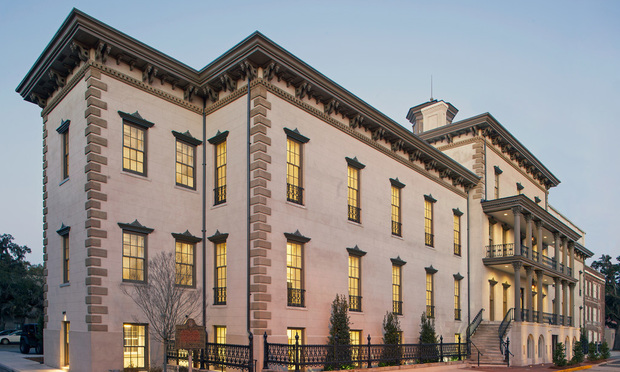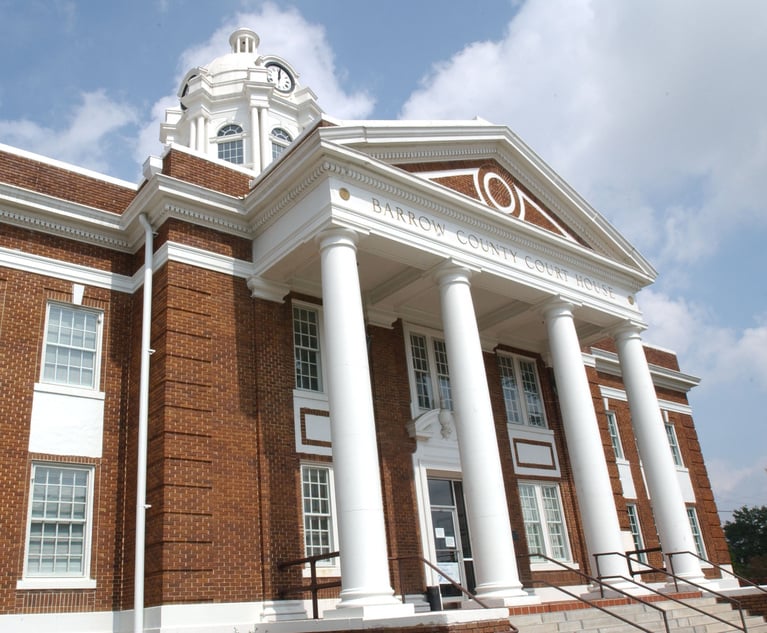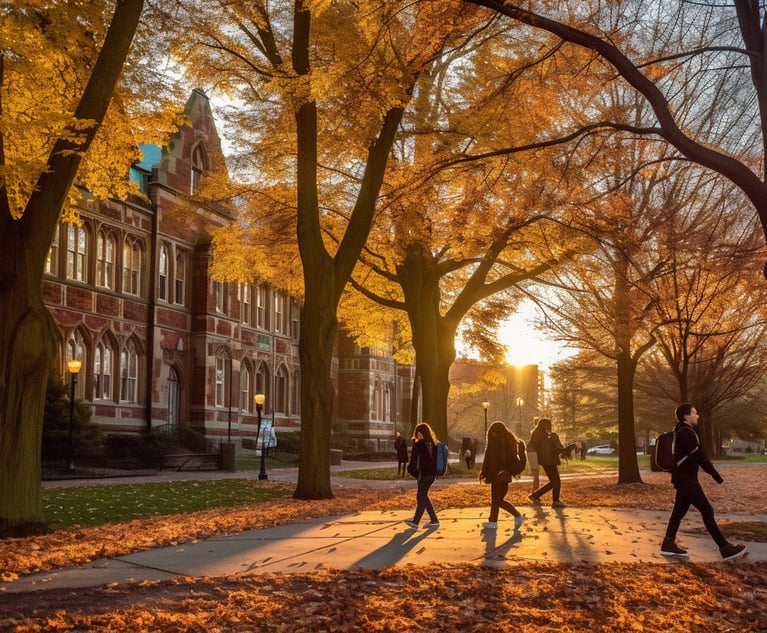Law Students and Alums Seek to 'Save Savannah' From Closing
Supporters of the institution hope to convince a public university to take over the school.
March 28, 2018 at 04:54 PM
5 minute read
 Savannah Law School.
Savannah Law School.
Students and alumni of Savannah Law School are banding together to try to stave off its closure.
They have formed a group called Saving Savannah that aims to promote the school's successes and importance to the local community in hopes that a public university will take it over and keep it open.
“We remain hopeful that another public entity will see the value in what has been built here and can nurture it the way it should have been nurtured in the first place,” said third-year student Erica Drew, who is helping organize Saving Savannah.
Savannah Law School is a branch campus of Atlanta's John Marshall Law School—a for-profit institution—and administrators announced last week that the branch will close due to lower than anticipated enrollment. It opened in 2012.
But students and alumni said the decision to pull the plug on Savannah Law is short-sighted, and that the faculty there has managed to build a unique law school that punches above its weight despite little support from the home campus in Atlanta.
They describe a tight-knit and nurturing law school where students and faculty know each other personally, where professors are always accessible to students, and where students and faculty bring spouses, children, and parents to the school's annual potluck.
“It's a different kind of law school,” said Constance Cooper, who graduated from Savannah Law in December. “How most law schools are back biting, mean, and a pretty traumatic experience for so many students, Savannah Law School was the opposite of that. Everybody works together. My professors and I are friends. Everybody is so close there.”
Because the professors know all their students so well—not just their research assistants—they can write effective letters of recommendations for clerkships and other jobs, Drew said.
“We've been able to do such impressive things,” she said. “We've got five federal clerks coming out of this law school in seven years. You have this unranked, relatively unknown law school turning out federal clerks. That's unheard of, and it's because of the quality of the faculty and the legal education we have here.”
Drew has secured a two-year clerkship in the office of the chief immigration judge in the U.S. Department of Justice, through the department's honors program.
Cooper said the quality of the school's faculty also sets it apart. She pointed to professor Caprice Roberts, who has co-authored several remedies casebooks, and Andrew Wright, a former White House associate counsel in the Obama administration.
“When you look at the quality of the education we have, and you compare it to Atlanta's John Marshall, it's laughable,” Cooper said. “We are as similar to Atlanta's John Marshall as Cinderella is to an ugly stepsister.”
The group hasn't reached out to any possible saviors yet, Drew said, though any university in the state could presumably take it over. The closest two public institutions are Savannah State University and Georgia Southern University's Armstrong Campus.
But it's unclear whether John Marshall officials would agree to or participate in any effort to find the school a new home. John Marshall officials on Wednesday declined a request for comment on the formation of Saving Savannah and its goal of keeping Savannah Law open.
“I would imagine that, because Savannah Law School is owned by Atlanta's John Marshall, they would have to be involved somehow,” Drew said. “With their decision to close the campus, I don't see why they'd be opposed to something like that.”
Meanwhile, Savannah law students have filed a putative class action against Atlanta's John Marshall for breach of contract and negligence. The suit alleges that John Marshall misrepresented students about Savannah's financial stability and improperly lowered their grades so that they would lose conditional scholarships, among other claims.
John Marshall officials told students last week that they would continue to offer classes for existing students through graduation at a new Savannah location. But the school's campus, a restored, historic hospital on the city's famed Forsyth Park, had already been sold off. The school must relocate at the end of the spring semester. They also offered students a one-time $2,000 relocation fee to move to Atlanta and take classes at the main campus.
But the law school plays an important role in Savannah's legal and wider community, Drew said. Its students clerk for local judges and perform pro bono work at the district attorney and public defender offices. Students volunteer as Court Appointed Special Advocates for children in the foster care system and with other local non-profits, she added.
Saving Savannah will be highlighting those contributions to state lawmakers, public university leaders and others, Drew said.
“Don't underestimate this school,” Cooper said. “I hope we can pull this out, because this school has meant so much to us.”
This content has been archived. It is available through our partners, LexisNexis® and Bloomberg Law.
To view this content, please continue to their sites.
Not a Lexis Subscriber?
Subscribe Now
Not a Bloomberg Law Subscriber?
Subscribe Now
NOT FOR REPRINT
© 2025 ALM Global, LLC, All Rights Reserved. Request academic re-use from www.copyright.com. All other uses, submit a request to [email protected]. For more information visit Asset & Logo Licensing.
You Might Like
View All
From 'Confusing Labyrinth' to Speeding 'Roller Coaster': Uncertainty Reigns in Title IX as Litigators Await Second Trump Admin
6 minute read
University of Georgia School of Law Finds Next Dean on Its Own Faculty
3 minute read
Teen Charged in Barrow School Shooting and His Father to Stay in Custody After Hearings
5 minute readTrending Stories
Who Got The Work
J. Brugh Lower of Gibbons has entered an appearance for industrial equipment supplier Devco Corporation in a pending trademark infringement lawsuit. The suit, accusing the defendant of selling knock-off Graco products, was filed Dec. 18 in New Jersey District Court by Rivkin Radler on behalf of Graco Inc. and Graco Minnesota. The case, assigned to U.S. District Judge Zahid N. Quraishi, is 3:24-cv-11294, Graco Inc. et al v. Devco Corporation.
Who Got The Work
Rebecca Maller-Stein and Kent A. Yalowitz of Arnold & Porter Kaye Scholer have entered their appearances for Hanaco Venture Capital and its executives, Lior Prosor and David Frankel, in a pending securities lawsuit. The action, filed on Dec. 24 in New York Southern District Court by Zell, Aron & Co. on behalf of Goldeneye Advisors, accuses the defendants of negligently and fraudulently managing the plaintiff's $1 million investment. The case, assigned to U.S. District Judge Vernon S. Broderick, is 1:24-cv-09918, Goldeneye Advisors, LLC v. Hanaco Venture Capital, Ltd. et al.
Who Got The Work
Attorneys from A&O Shearman has stepped in as defense counsel for Toronto-Dominion Bank and other defendants in a pending securities class action. The suit, filed Dec. 11 in New York Southern District Court by Bleichmar Fonti & Auld, accuses the defendants of concealing the bank's 'pervasive' deficiencies in regards to its compliance with the Bank Secrecy Act and the quality of its anti-money laundering controls. The case, assigned to U.S. District Judge Arun Subramanian, is 1:24-cv-09445, Gonzalez v. The Toronto-Dominion Bank et al.
Who Got The Work
Crown Castle International, a Pennsylvania company providing shared communications infrastructure, has turned to Luke D. Wolf of Gordon Rees Scully Mansukhani to fend off a pending breach-of-contract lawsuit. The court action, filed Nov. 25 in Michigan Eastern District Court by Hooper Hathaway PC on behalf of The Town Residences LLC, accuses Crown Castle of failing to transfer approximately $30,000 in utility payments from T-Mobile in breach of a roof-top lease and assignment agreement. The case, assigned to U.S. District Judge Susan K. Declercq, is 2:24-cv-13131, The Town Residences LLC v. T-Mobile US, Inc. et al.
Who Got The Work
Wilfred P. Coronato and Daniel M. Schwartz of McCarter & English have stepped in as defense counsel to Electrolux Home Products Inc. in a pending product liability lawsuit. The court action, filed Nov. 26 in New York Eastern District Court by Poulos Lopiccolo PC and Nagel Rice LLP on behalf of David Stern, alleges that the defendant's refrigerators’ drawers and shelving repeatedly break and fall apart within months after purchase. The case, assigned to U.S. District Judge Joan M. Azrack, is 2:24-cv-08204, Stern v. Electrolux Home Products, Inc.
Featured Firms
Law Offices of Gary Martin Hays & Associates, P.C.
(470) 294-1674
Law Offices of Mark E. Salomone
(857) 444-6468
Smith & Hassler
(713) 739-1250







